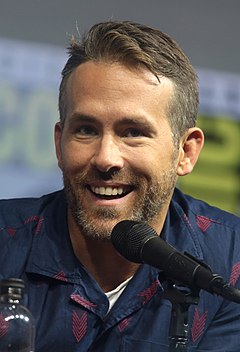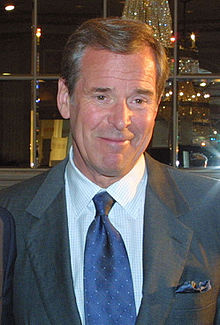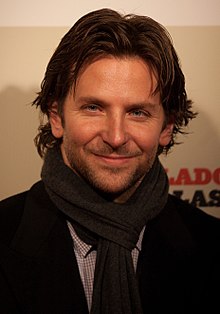Portal:Television
The Television Portal

Television (TV) is a telecommunication medium for transmitting moving images and sound. Additionally, the term can refer to a physical television set, rather than the medium of transmission. Television is a mass medium for advertising, entertainment, news, and sports. The medium is capable of more than "radio broadcasting", which refers to an audio signal sent to radio receivers.
Television became available in crude experimental forms in the 1920s, but only after several years of further development was the new technology marketed to consumers. After World War II, an improved form of black-and-white television broadcasting became popular in the United Kingdom and the United States, and television sets became commonplace in homes, businesses, and institutions. During the 1950s, television was the primary medium for influencing public opinion. In the mid-1960s, color broadcasting was introduced in the U.S. and most other developed countries.
In 2013, 79% of the world's households owned a television set. The replacement of earlier cathode-ray tube (CRT) screen displays with compact, energy-efficient, flat-panel alternative technologies such as LCDs (both fluorescent-backlit and LED), OLED displays, and plasma displays was a hardware revolution that began with computer monitors in the late 1990s. Most television sets sold in the 2000s were flat-panel, mainly LEDs. Major manufacturers announced the discontinuation of CRT, Digital Light Processing (DLP), plasma, and even fluorescent-backlit LCDs by the mid-2010s. LEDs are being gradually replaced by OLEDs. Also, major manufacturers have started increasingly producing smart TVs in the mid-2010s. Smart TVs with integrated Internet and Web 2.0 functions became the dominant form of television by the late 2010s. (Full article...)
Selected article -
Selected image -

The Emmy Award is an American television production award, similar in nature to the Peabody Awards but more focused on entertainment, and is considered the TV equivalent of the Oscars. The best-known of the awards are the Primetime Emmys, and the Daytime Emmy Awards, with both having categories classified as Creative Arts Emmys.
Did you know (auto-generated) -

- ... that actor Tatsunari Kimura ate pancakes and drank coffee while talking for eight hours during the filming of the television drama Old-Fashioned Cupcake?
- ... that after being wiped by the BBC, all four episodes of the Doctor Who serial The Time Meddler were discovered in Nigeria in 1984?
- ... that Colin Mackay, the political editor at Scottish Television, was "very sad" when Colin MacKay, the political editor at Scottish Television, died?
- ... that Angelito de Canal 13, the mascot of the Chilean television network Canal 13, was inspired by its creator's son?
- ... that the 1999 video game Interplay Sports Baseball Edition 2000 used a public-address announcer while its rivals were switching to two commentators as featured on real MLB game broadcasts?
- ... that Angeline Quinto has recorded songs for at least 35 films and television soundtracks in the Philippines?
Selected quote -
More did you know
- ...that The Simpsons' history began when Matt Groening conceived of the dysfunctional family in the lobby of James L. Brooks's office?
- ...that the air-date of "The Beginning of the End", the fourth season premiere of the television series Lost, means that the season may be interrupted by the 2007 Writers Guild of America strike even if a settlement is reached?
- ...that children up to the age of five can find it difficult to distinguish between television programmes and toy advertising campaigns?
- ...that the color signals of Israel Broadcasting Authority television transmissions were erased until 1981, to insure equality for families who couldn't afford color-tv?
- ...that the television series ER aired an episode based on the 2003 Chicago balcony collapse?
Selected biography -
Peter Charles Archibald Ewart Jennings CM (July 29, 1938 – August 7, 2005) was a Canadian-American television journalist, best known for serving as the sole anchor of ABC World News Tonight from 1983 until his death from lung cancer in 2005. Despite dropping out of high school, Jennings transformed himself into one of American television's most prominent journalists.
Jennings started his career early, hosting a Canadian radio show at age 9. He began his professional career with CJOH-TV in Ottawa during its early years, anchoring the local newscasts and hosting the teen dance show Saturday Date on Saturdays. In 1965, ABC News tapped him to anchor its flagship evening news program. Critics and others in the television news business attacked his inexperience, making his job difficult. He became a foreign correspondent in 1968, reporting from the Middle East. (Full article...)General images
At the 6th Daytime Emmy Awards held in 1979, Peter Hansen was the first winner of this award for his portrayal of Lee Baldwin on General Hospital. The awards ceremony was not televised in 1983 and 1984, having been criticized for voting integrity. Following the introduction of a new category in 1985, Outstanding Younger Actor in a Drama Series, the criteria for this category was altered, requiring all actors to be aged 26 or above. (Full article...)
Peter Rogers and Gerald Thomas were the series' sole producer and director respectively. They mostly employed the same crew and a regular group of actors. The main cast predominantly featured Sid James, Kenneth Williams, Charles Hawtrey, Joan Sims, Kenneth Connor, Peter Butterworth, Hattie Jacques, Terry Scott, Bernard Bresslaw, Barbara Windsor, Jack Douglas and Jim Dale. The Carry Ons comprise the largest number of films of any British series and, next to the James Bond films, are the second-longest continually-running UK film series (with a fourteen-year hiatus between 1978 and 1992). Between 1958 and 1992, there were seven writers, principally Norman Hudis (1958–62) and Talbot Rothwell (1963–74). The films were scored by three different composers: Bruce Montgomery from 1958–62; Eric Rogers (1963–75, 1977–78) and Max Harris who scored the 1976 film Carry On England. (Full article...)

Ryan Reynolds is a Canadian actor and producer who has appeared in films, television series, videos, and Video games. Reynolds made his acting debut on television in the teen drama Fifteen in 1991. Two years later, he made his feature film debut by playing an orphan raised in India, who is inspired by Mahatma Gandhi to go on a hunger strike in a small town in Canada in Ordinary Magic (1993). Reynolds had a recurring role on the television show The Odyssey (1993). He followed this with minor appearances on The X-Files (1996), and the television film Sabrina the Teenage Witch (1996). His breakthrough role was as medical student Michael "Berg" Bergen in the sitcom Two Guys and a Girl.
He also played a slacker in National Lampoon's Van Wilder (2002), and vampire hunter Hannibal King in Blade: Trinity (2004) with Wesley Snipes. Reynolds appeared in lead roles in the commercially successful romantic comedies Just Friends (2005), Definitely, Maybe (2008), and The Proposal (2009). In 2010, he played a military contractor who is captured by terrorists in the psychological thriller Buried. The following year, Reynolds starred in the title role of the superhero film Green Lantern, which received a generally negative reception from the critics and underperformed at the box office leading to a decline in his career. In 2013, he voiced a garden snail in Turbo and a caveman in The Croods. Two years later, he appeared in the drama Mississippi Grind and played lawyer E. Randol Schoenberg in Woman in Gold. (Full article...)
Penn & Teller: Bullshit! is an American documentary television series that aired for eight seasons from 2003 to 2010 on the premium cable channel Showtime. Penn & Teller: Bullshit! was hosted by professional magicians and skeptics Penn & Teller. Its format consists of debating political topics, often from a naturalist libertarian capitalist point of view (the political philosophy espoused by both Penn and Teller) or aiming to debunk pseudoscientific ideas, paranormal beliefs, popular fads and misconceptions. The hosts examine topics within the analytical structure of science.
The television program has been nominated for 21 awards, winning two. The Writers Guild of America bestowed an award upon the program in 2004 recognizing excellence in its writing quality. It received an award from the Independent Investigations Group in 2008, recognizing the show's contribution to public understanding of scientific skepticism and rational thinking. In addition, over the course of its run Penn & Teller: Bullshit! garnered a Directors Guild of America Award nomination, 13 Primetime Emmy Award nominations, and five Writers Guild of America Award nominations. (Full article...)
| Season | Episodes | Segments | Originally aired | ||
|---|---|---|---|---|---|
| First aired | Last aired | ||||
| 1 | 20 | 41 | May 1, 1999 | March 3, 2001 | |
| 2 | 20 | 39 | October 20, 2000 | July 26, 2003 | |
| 3 | 20 | 37 | October 5, 2001 | October 11, 2004 | |
| 4 | 20 | 38 | May 6, 2005 | July 24, 2007 | |
| 5 | 20 | 41 | February 19, 2007 | July 19, 2009 | |
| 6 | 26 | 47 | March 3, 2008 | July 5, 2010 | |
| 7 | 26 | 50 | July 19, 2009 | June 11, 2011 | |
| 8 | 26 | 47 | March 26, 2011 | December 6, 2012 | |
| 9 | 26 | 49 | July 21, 2012 | February 20, 2017 | |
| 10 | 11 | 22 | October 15, 2016 | December 2, 2017 | |
| 11 | 26 | 50 | June 24, 2017 | November 25, 2018 | |
| 12 | 31 | 53 | November 11, 2018 | April 29, 2022 | |
| 13 | 28 | 54 | October 22, 2020 | November 1, 2023 | |
| 14 | 26 | TBA | November 2, 2023 | TBA | |
Lee trained at the Royal Academy of Dramatic Art, before making his professional stage debut in 1924. He appeared on film for the first time in 1934 in the Leslie Howard Gordon-directed comedy The Double Event, where he played the part of Dennison. Although he was in wartime service with the Royal Sussex Regiment between 1940 and 1946, he had already been in several films, which were released between 1939 and 1943. He returned to acting after the war and was offered a role in the play Stage Door while awaiting his demob. (Full article...)
| Season | Episodes | Originally aired | Rank | Average viewers (in millions) | ||
|---|---|---|---|---|---|---|
| First aired | Last aired | |||||
| 1 | 22 | September 27, 2015 | May 15, 2016 | 55 | 8.05 | |
| 2 | 22 | September 25, 2016 | May 15, 2017 | 99 | 4.53 | |
| 3 | 13 | April 26, 2018 | August 3, 2018 | — | — | |
News
- December 28: US professional wrestler Jon Huber dies aged 41
- September 2: Tributes paid to recently deceased US actor Chadwick Boseman
- May 24: Japanese professional wrestler and Netflix star Hana Kimura dies aged 22
- January 16: BBC newsreader Alagiah to undergo treatment for bowel cancer
- Upcoming events
Featured content
Main topics
History of television: Early television stations • Geographical usage of television • Golden Age of Television • List of experimental television stations • List of years in television • Mechanical television • Social aspects of television • Television systems before 1940 • Timeline of the introduction of television in countries • Timeline of the introduction of color television in countries
Inventors and pioneers: John Logie Baird • Alan Blumlein • Walter Bruch • Alan Archibald Campbell-Swinton • Allen B. DuMont • Philo Taylor Farnsworth • Charles Francis Jenkins • Boris Grabovsky • Paul Gottlieb Nipkow • Constantin Perskyi • Boris Rosing • David Sarnoff • Kálmán Tihanyi • Vladimir Zworykin
Technology: Comparison of display technology • Digital television • Liquid crystal display television • Large-screen television technology • Technology of television
Terms: Broadcast television systems • Composite monitor • HDTV • Liquid crystal display television • PAL • Picture-in-picture • Pay-per-view • Plasma display • NICAM • NTSC • SECAM
Categories
WikiProjects

|
You are invited to participate in WikiProject Television, a WikiProject dedicated to developing and improving articles about Television. |
- Main projects
- Sub-projects
Television Stations • American animation • American television • Australian television • British TV • BBC • Canadian TV shows • Television Game Shows • ITC Entertainment Productions • Digimon • Buffyverse • Doctor Who • Degrassi • EastEnders • Episode coverage • Firefly • Futurama • Grey's Anatomy • Indian television • Lost • Nickelodeon • The O.C. • Professional Wrestling • Reality TV • The Simpsons • Seinfeld • South Park • Stargate • Star Trek • Star Wars • Soap operas • Avatar: The Last Airbender • House
- Related projects
Animation • Anime and manga • Comedy • Comics • Fictional characters • Film • Media franchises
What are WikiProjects?
Things you can do

- Place the {{WikiProject Television}} project banner on the talk pages of all articles within the scope of the project.
- Write: Possible Possum
- Cleanup: color television, Alien Nation: Body and Soul, The Sopranos, Alien Nation: Dark Horizon, Alien Nation: The Enemy Within, Alien Nation: Millennium, Aang
- Expand: Timeline of the introduction of color television in countries
- Stubs: Flow (television), Just for Kicks (TV series), Play of the Month, Nova (Dutch TV series), More stubs...
Subportals
Related portals
Associated Wikimedia
The following Wikimedia Foundation sister projects provide more on this subject:
-
Commons
Free media repository -
Wikibooks
Free textbooks and manuals -
Wikidata
Free knowledge base -
Wikinews
Free-content news -
Wikiquote
Collection of quotations -
Wikisource
Free-content library -
Wikiversity
Free learning tools -
Wiktionary
Dictionary and thesaurus





























































